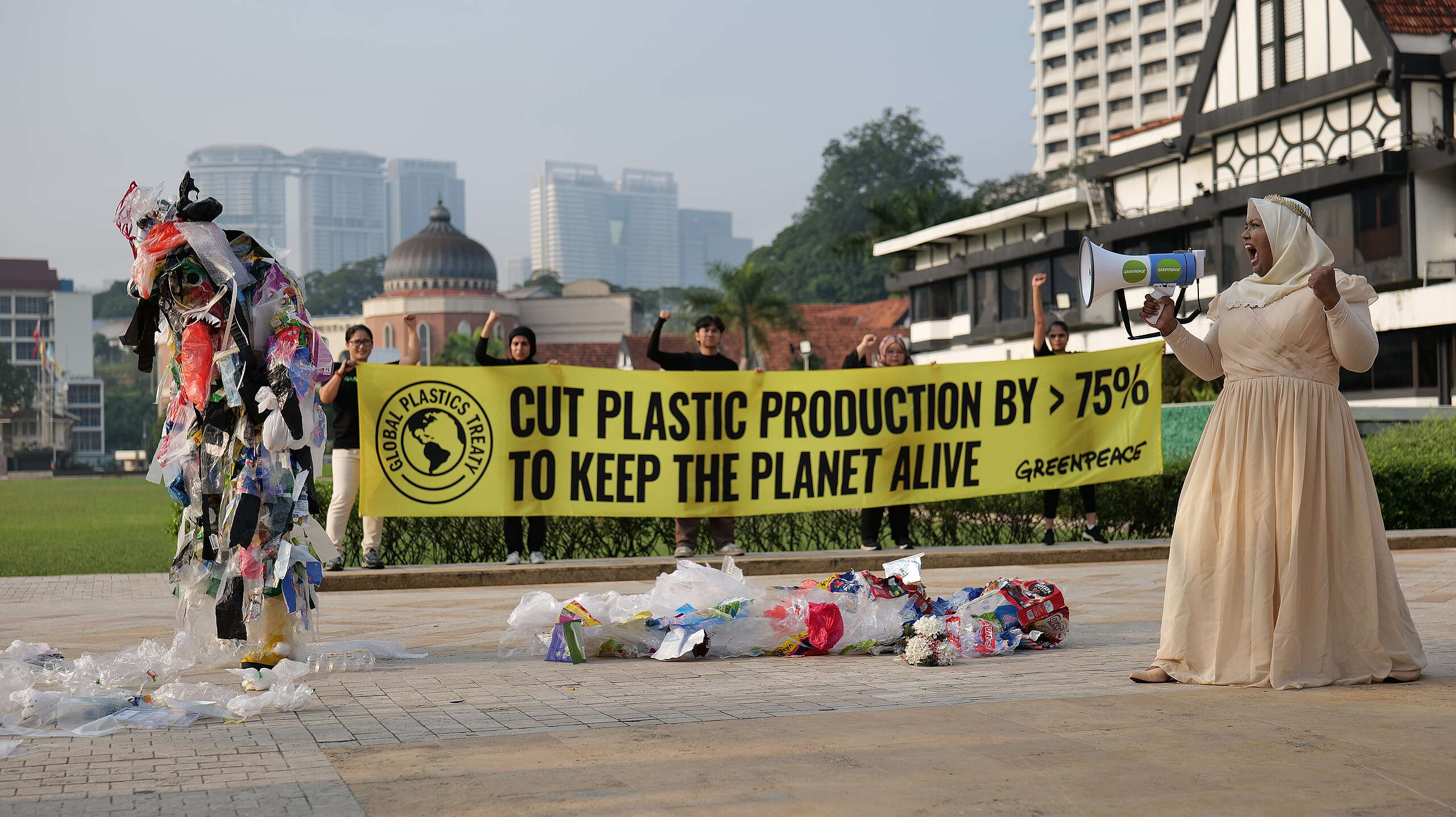Greenpeace Malaysia stands in heartfelt solidarity of the plight and immense hardships that communities devastated by floods they are enduring. Their resilience in the face of such challenges inspires us to call for immediate and decisive action to protect lives, restore livelihoods, and preserve the nation’s natural heritage for future generations. They also deserve our government’s utmost attention in addressing this long-running issue that has taken lives and livelihoods.
The yearly and increasing intensity of floods and landslides, raises the urgent need to address one of the major root causes; namely deforestation, unlawful logging and unsustainable practices that poor forest government and insufficient forest protection result in. As such, we join in the call for climate action to tackle floods and landslides through holistic approaches, that includes stronger forest governance.
The loss of forests through uncontrolled deforestation and unsustainable or illegal logging for monoculture farming, has been contributing to more frequent, severe and intense flooding in several states. This is in addition to increasing soil erosion issues that lead to landslides as a result of the reduction in the soil’s capacity to retain water with the increasing absence of trees, and their roots.
Last month, the Minister of Natural Resources and Environment Sustainability revealed that a total of 1,074 permanent forest reserve areas in the Peninsular, equivalent to over 53,700 football fields, were illegally cleared as of December 31 last year, the land was cleared for various purposes including agriculture, plantations, aquaculture, mining, property and infrastructure development. Just recently, the Kelantan State government did not deny the possibility of degazetting a permanent forest reserve, a potential environmentally destructive threat that looms large in the face of potential profits from mining for rare earth elements (REE). According to Global Forest Watch, the state has lost approximately 179,000 hectares (179kha) of primary forest between 2002 and 2023 – that roughly translates to 250,000 FIFA football fields worth of forests in Kelantan alone in a decade.
Greenpeace Malaysia Senior Programme Manager Thing Siew Shuen said:
“Deforestation has far-reaching consequences beyond its immediate ecological impact. Not only is it an inhumane act against indigenous communities, but it also drives climate injustice, causing loss of lives and damage to properties, particularly in urban areas where many settlements are built along rivers.”
“The government must abandon the ‘business-as-usual’ approach—this is a crucial moment for decisive action. Outdated laws and practices from the 1970s, when the population was less than 10 million (just one-third of the current population), are no longer sufficient to address the scale of the crisis. Immediate and comprehensive reforms are necessary to protect forests, uphold human rights, and ensure the safety and sustainability of all communities.”
Call to action:
Greenpeace Malaysia hereby advocates for the implementation of a comprehensive forestry law. This proposed legislation aims to address the multifaceted aspects of forest management, conservation, and sustainable utilisation within the nation. It is imperative that such a law be enacted to ensure the long-term preservation of our natural resources and to establish a robust regulatory framework for the forestry sector.
- Resolve the ambiguous definitions of forest-related terminology in the Forestry Legislation, such as “forest cover”, “tree cover”, and many more.
- Appoint competent leadership and personnel within the forestry department who are proficient in environmental matters.
- Establish an independent monitoring and auditing system within the state government.
- Diverse agriculture with biodiversity-promoting measures is more resilient to global challenges and crises. It ensures that the functioning of agricultural ecosystems is maintained and thus provides sustainable productivity and greater food security.
- Implement a transparent approval process for forestry certification, revise and harmonise the specificities surrounding the rules and regulations in accordance with globally recognised standards.
- Advocate that all nature restoration and protection measures affecting Indigenous lands and traditional territories should be planned and executed in collaboration with IPLCs in a participative approach that respects and integrates their perspectives and invaluable and irreplaceable knowledge. These measures should also focus on areas that are critical for conserving biocultural diversity, i. e. biodiversity, language, cultural and knowledge systems. This should explicitly be reflected in the ongoing revisions of national biodiversity strategies and action plans.
- Ensure that gazettes are freely and easily available to enable independent monitoring of forest changes, allowing concerned citizens to check the status of Permanent Reserved Forests (PRFs) in their vicinity.
- The federal government has implemented a substantial increase in the ecological fund transfer (EFT) for biodiversity conservation, elevating it from RM70 million in 2021 to RM200 million in 2024, representing a significant increase of over 185 percent. Notwithstanding this considerable augmentation, the current allocation remains insufficient to address the comprehensive needs of biodiversity conservation efforts. Moreover, the EFT be formally integrated into a structured conservation financial regulatory framework to ensure its long-term efficacy and sustainability.
ENDS



